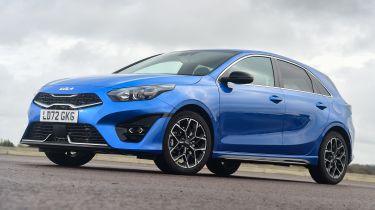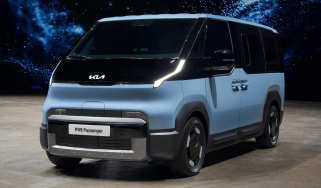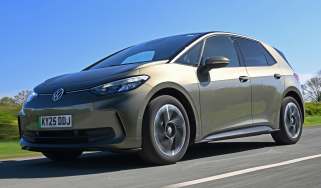Kia Ceed - MPG, CO2 and running costs
Latest Ceed's mild-hybrid engines help reduce fuel consumption and emissions, with overall running costs pretty reasonable

The third-generation Kia Ceed is offered exclusively with a 1.5-litre petrol set-up. According to Kia, when paired with a six-speed manual transmission, the Ceed can return up to 51.4mpg and 125g/km of CO2. However, if you get the DCT automatic gearbox, the claimed fuel economy drops to 46.3mpg, while CO2 emissions increase to 137g/km.
When we pitted the Ceed in GT-Line spec against a Honda Civic and facelifted Toyota Corolla, the Kia achieved a respectable 43.5mpg, which equates to a real-world range of 478 miles on a full tank of petrol. However, because both the Honda and Toyota utilise full-hybrid technology, they returned much more impressive figures of 50.3 and 54.2mpg, respectively.
There isn’t a plug-in hybrid Ceed like you’ll find in the SEAT Leon and VW Golf GTE, so company car drivers must look at the Kia Xceed instead. Kia claims the plug-in hybrid of its Xceed will manage 201.7mpg, although, of course, you'll need to ensure the battery is regularly topped up to achieve anywhere near this figure. Company car drivers will find the PHEV particularly interesting as its 32g/km of CO2 meaning it attracts a BiK rate of 14 per cent.
Insurance groups
Insurance ratings are fairly competitive, with the Ceed lineup ranging between groups 14 and 18. Predictably, the entry-level 2 trim with manual gearbox sits in the lowest group, while the range-topping GT-Line S with DCT automatic transmission incurs the largest premiums.
In comparison, the least powerful 123bhp Ford Focus in Titanium trim is in group 15.
Check if your car needs an MoT and view its complete history with our MoT History Checker...
Depreciation
Residual values for the Kia Ceed are higher than some of its rivals, although they still fall behind the Toyota Corolla and VW Golf. A long equipment list and Kia’s transferable seven-year warranty help to keep values strong, and after three years and 36,000 miles you can expect to get an average of 46 to 51 per cent of its original list price back.
To get an accurate valuation on a specific model check out our valuation tool...








